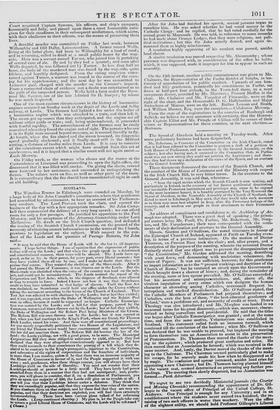SCOTLAND.
The Waterloo Rooms in Edinburgh were crowded on Monday, by a large body of Sir John Campbell's constituents, whom that gentleman had assembled by advertisement, to hear an account of his Parliamen- tary conduct. The Lord Provost took the chair, and opened the business of the day with a few appropriate remarks. Sir John Camp- bell then commenced the delivery of a very long speech : we can afford room fur only a few passages. He justified his opposition to the Peel Ministry, and his acceptance of the Attorney-Generalship under Lord 3Ielbourite. Ile dwelt on the Irish Church question, and defended the issuing of the Scottish Church Commission, on the ground of the necessity of obtaining correct information as to the wants of the Church, previous to legislation on the subject. With respect to the con- duct of the Lords and the question of Peerage Reform, Sir John said- " It may be said that the House of Lords will be the bar to all improve- ments. I hope better things. I am of opinion that the expression of public feeling will sway the Lords; and that when the people speak in a determined
'
and constitutional manner, their voice will be obeyed. The Lords have op- posed, as far as lay in their power, for years past, every liberal measure; but they have yielded them all one by one, and I make no doubt that they will pursue that course. They resisted the abolition of the Slave-trade. After it hail passed the House of Commons, it was thrown out in the Lords. But the Slave-trade was abolished when the voice of the country was loud on the sub- ject, and could not be misunderstood. The Lords resisted the repeal of the Corporation and Test Acts; which, to the disgrace of Scotland, were allowed so long to remain in force. Indeed I know not how it was that Scotchmen could so long have submitted to that badge of slavery. Until the Test Act was abolished, no Scotchman could hold any office under the Crown without taking the sacrament according to the forms of the Church of England. That Test Act was adhered to with obstinacy by the Lords ; but at last they yielded ; and it was repealed, even when the Duke of Wellington and Sir Robert Peel were in office, because it could be supported no longer. Catholic Emancipa- tion was resisted by the Lords; and a bill for that purpose, passed by the Commons, was several times thrown out by the Lords; but at last they yielded, the Duke of Wellington and Sir Robert Peel being Ministers of the Crown. The Reform Bill was once thrown out by the Lords; but it was carried at Last, when you had meetings in the King's Park, where my friend, Sir Thomas Dick Lauder, raised his voice. And these were all constitutional proceedings ; for you merely respectfully petitioned the two Houses of the Legislature, and my friend Sir Thomas never would have countenanced any such meetings if the law (lid not sanction them. The Reform Bill did become the law of the .land; the Lords yielding, not with a good grace, to be sure. The Municipal Corporations Bill they were obliged in substance to yield, although they had declared that they were altogether conscientiously opposed to it. But how they could reconcile to their consciences the passing of a bill which they de. • dared to be contrary to the King's prerogative, injurious to the Constitution, and subversive of the tights of corporations and the franchise of individuals, is more than I can resolve, unless it be that there was an immense majority of the House of Commons in favour of it, and the People supported it with one voice ; and, gentlemen, when these things concur, you will always have their Lordships yield on the side of liberality. You need not wonder that their :Lordships should at present be a little restiff. They have lately had power snatched .from them in a manner that they had not anticipated ; and, gentle- men, you will please to consider, that if, on a dissolution of Parliament, you give us again our majority of 2:50, the Lords will give us no trouble at all. I eall tell you that their Lordships labour under a delusion. They think that they are exceedingly popular, and that they express the true voice of the nation. If you disabuse them on that subject, and let them find that they are very un- popular, and that their doctrines are exploded, you will find them extremely accommodating. There have been various plans talked of for reforming the Lords. (Long-continued cheering.) My plan is, let the People take care to return a good Liberal House of Commons, and the Lords will be retained " ( Chaim) After Sir John bad finished his speech, several persons began to catechize him. He was asked whether lie had voted money to the Catholic Clergy: and he replied, that he had voted cordially for the annual grant to Maynooth. He was told, in reference to some remarks be had made about Orange Lodges, that they were religious, not poli- tical institutions ; but this Sir John utterly denied, and again de- nounced them as highly mischievous. A resolution highly approving of his conduct was passed, amidst loud cheers.
A similar resolution was passed respecting Mr. Abercromby ; whose presence was dispensed with, in consideration of the office he holds, which, it was supposed, made it improper fur him to appear in such an assembly.


























 Previous page
Previous page